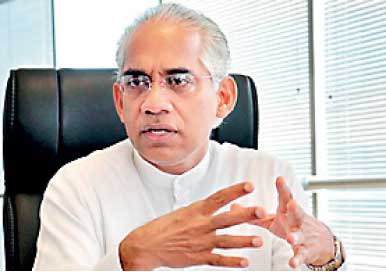Thursday Feb 26, 2026
Thursday Feb 26, 2026
Thursday, 23 June 2016 00:29 - - {{hitsCtrl.values.hits}}
By Ashwin Hemmathagama
– Our Lobby Correspondent
The controversial report of the Auditor General accusing the Government of exceeding borrowing limits of Rs.1.78 trillion in FY2015 came under fire yesterday in Parliament.
Minister of Finance Ravi Karunanayake rejecting the Auditor General’s report, which shows Government exceeding approved borrowing limits set by the Parliament said: “Appropriation Act No.41 of 2014, Appropriation Act (Amendment) No.1 and No.15 of 2015 provided the necessary approvals to borrow up to Rs.1.78 trillion. We have not exceeded this limit and the borrowings are well within it. In case we needed to exceed the limits an appropriation bill could have been presented in the Parliament.”
Explaining the methods used to bridge the budget deficit on a short term basis the Minister highlighted the importance of treasury bills used throughout history by successive Governments. “We have followed the accepted norms of the World Bank and the IMF in using treasury bills to meet our short term requirements by taking the net value into consideration. The ceiling should be increased if we follow the Auditor General’s opinion by taking the gross value into consideration, which will have an adverse impact on the money market and the interest rates. Most importantly we will also find it difficult to reverse the borrowings with rate fluctuations.”
According to the Minister, the Auditor General has followed a system, which was not followed before on the republic’s financial statements and has a direct impact on the credit rating of the nation. “Issuing baseless statements, which lack any scientific background, lead to spreading wrong information about the Government. This is not the ideal thing to do if financial discipline is to be protected,” he added.
The Auditor General in his report charged the Government for exceeding the limit authorisation by Rs.1,569,805 million during FY 2015. “Even though loans not exceeding Rs.1.78 trillion could have been raised whether in or outside Sri Lanka in 2015 for and on behalf of the Government in accordance with the applicable laws and in terms of section 2 (1) (b) of the Appropriation Act No.41 of 2014, according to the Financial Statements of the Republic, domestic and foreign loans amounting to Rs.3,349,805 million had been exceeded by Rs.1,569,805 million during the FY 2015. Comparatively, the limit on loans authorised by Parliament during the preceding year had been exceeded by Rs.1,164,775 million,” held the Auditor General in his report on the financial statements of the country for 2015. Addressing more issues found in the Auditor General’s report Minister Karunanayake listed due action he would take to put things on the correct track. “We will appoint a member to the Telecommunication Regulatory Commission (TRCSL), which doesn’t come under the preview of the Treasury and monitor financial matters. We will need a considerable time to account for the motor cycles obtained on lease during 2015. We will complete the records before the end of this year. The money released to Gin Nilwala River Diversion Project has taken place a day prior to the Presidential Election in 2015. In case the project is not taking place the monies could be recovered from the bid security,” added Minister Karunanayake.
 Deviating from regular audit methodology and adopting some updates were seen as the possible cause for the confusion in the Auditor General report on republic’s debt in 2015.
Deviating from regular audit methodology and adopting some updates were seen as the possible cause for the confusion in the Auditor General report on republic’s debt in 2015.
Challenging the Auditor General’s report, Deputy Minister of Public Enterprise Development Eran Wickramaratne said that the changes in methodology have an impact on the report, which should be changed unless the same methodology will continue to be in practice.
“There is no logical explanation available if government debt doubles within a year. People would ask how these monies were spent. These are large amounts of money totalling trillions. According to the records, we have borrowed within the Parliament approved limits of borrowing. Ideally the Auditor General should have calculated the specific increase instead of the total debt, which gets retired from time to time,” he told a media conference within the Parliament complex last evening.
According to Minister, the Government borrowed Rs.1.532 trillion and has repaid Rs.1.606 trillion worth of Treasury Bills creating a deficit. “Compared with previous years there is a clear reduction of state borrowing made using treasury bills. But still the Government has stayed within the approved limits,” he added. However, showcasing values of democracy, Deputy Minister of Power and Renewable Energy Ajith P. Perera acknowledged the Auditor General’s right to have an independent opinion. “We respect the Auditor General’s report on the state borrowings but have our own explanation, which is different and the truth. As a responsible Government we remained within the limits of borrowing set by the parliament,” said Deputy Minister Perera.